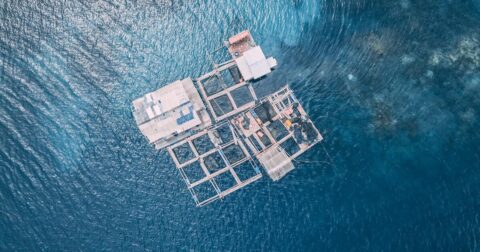Feature
The Sneaky Way Even Meat Lovers Can Lessen Their Climate Impact
Food•6 min read
Reported
Today, more fish are raised on farms than caught in the wild. Trump wants to keep it that way, so he's ordering Congress to lift environmental regulations on new offshore aquaculture facilities.


Words by Sara Zaat
On May 7, 2020, President Trump issued an Executive Order to promote the American seafood industry; specifically, the development of domestic aquaculture facilities. Aquaculture, the farming of fish and shellfish, is a billion-dollar industry in the United States that is rapidly expanding around the globe. Today, more seafood comes from farms than the wild, with 51 to 167 billion fish farmed globally in 2017. It’s challenging to make precise estimates of the number of farmed fish given the magnitude of this industry.
The order calls for the identification of locations for commercial aquaculture and the acceleration of offshore aquaculture permitting, directing agencies to produce environmental impact statements for proposed aquaculture projects within two years. Despite abundant scientific proof of fish sentience, the order is devoid of provisions for fish welfare. By paving the way for more aquaculture with complete disregard for the well-being of fish, the Trump administration’s new policy threatens to expand the sea of suffering.
But Trump’s plans to increase aquaculture development faced a roadblock in August when a federal court ruled that the attempt of the National Marine Fisheries Services (NMFS) to extend its reach to aquaculture was unauthorized under the law. The NMFS’s plan to issue aquaculture permits in federal waters was challenged and the court agreed, wary to open up the coasts to this industry—rightful concerns given the many disastrous events at offshore aquaculture facilities, such as the Cooke Aquaculture net-pen collapse that released hundreds of thousands of fish into the Pacific in 2017.
The court ultimately ruled that, because Congress had not authorized NMFS to issue permits in federal waters and because of the threats posed by aquaculture, it was for Congress, not the courts, to determine whether the federal government could regulate offshore aquaculture. This decision confirms that the executive aquaculture agenda is not above the law.
It’s no secret that farmed fish endure severe physical suffering due to abuse, overcrowding, and lack of medical care. Animal Outlook’s 2019 investigation of aquaculture giant Cooke revealed the horrors of the industry. That undercover footage showed workers brutally slamming fish into concrete and leaving them to languish in fungus-infested, overcrowded tanks.
In many instances, the aquaculture industry gets away with these abuses because it is often self-regulating, with private, third-party certification programs purportedly monitoring and attesting to farms’ compliance with the program’s meager fish welfare standards. The abuses at Cooke, a Global Aquaculture Alliance-certified company, occurred within this private regulatory framework, demonstrating the insufficiency of existing industry oversight of fish welfare and the need for government intervention. Unfortunately, there exists a lack of knowledge of what each of the hundreds of farmed fish species requires to not just be healthy, but also live well and thrive.
Even once fish welfare is better understood, advocating for legislation to protect fish may prove challenging. Despite the billions of fish suffering in industrial animal agriculture, fish are essentially invisible to the meager protections of federal law and not currently protected under the Animal Welfare Act, the Humane Methods of Livestock Slaughter Act or the Twenty-Eight Hour Transport Law. New, fish-specific laws would likely be more appropriate for addressing these non-terrestrial beings’ unique needs. Unfortunately, no such laws are in the works even though scholars have recommended them. Thus, developing legislative and regulatory frameworks that address fishes’ specific welfare requirements is a complex but needed feat that will require adequate time and consideration of emerging science to properly accomplish.
However, the acceleration of aquaculture development will likely outpace the scientific studies required to understand how to support farmed fish welfare and create informed legislation mandating such support. Checks from the courts have tempered Trump’s ambitious agenda. But the Trump order is far from the only threat to farmed fish welfare: crucially, there is still no legislation protecting farmed fish. The absence of government oversight means that investigations like the one Animal Outlook conducted in 2019 will prove vital in bringing the suffering of fish to light.
The ball is now in a political court: Congress. Will our legislators curb offshore aquaculture development by passing legislation such as the Keep Finfish Free Act of 2019, which stems the expansion of commercial aquaculture in federal waters? Or will they greenlight it by advancing the recently introduced, bipartisan Senate Bill 4723, which effectively fills the gap in aquaculture authority left by the Magnuson-Stevens Act—the primary law governing marine fisheries management in U.S. federal waters—by establishing a federal permitting system for offshore aquaculture facilities? In addressing the question of how to regulate aquaculture, will our legislators use their power and heed existing recommendations to draft fish-specific welfare laws?
The answers can be influenced by their constituents. Now is the time to speak out against the executive aquaculture agenda, demand legal protections for fish, and make it clear to legislators that fast-tracking the aquaculture industry without prioritizing fish welfare insults Americans’ growing valuation of animal welfare. With enough political pressure, Trump’s plan and the proposed bill supporting it can be curtailed, fish welfare legislation passed, and the fate of future farmed fish brightened.